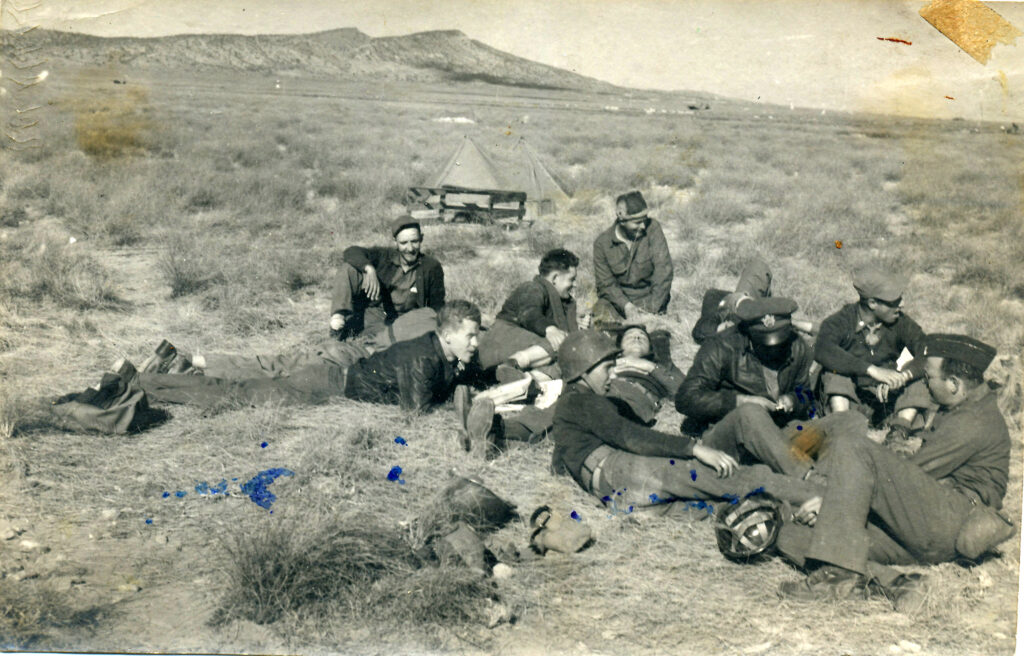Mon., Dec. 28, 1942—Joined rest of Squadron at Thelepte, Tunisia. They beat us here by one day because our transport (C-47) lost a gas cap and had to land.

Wed., Dec. 30, 1942—Sqdn. ran first combat missions today (two of them). Timm and Georgia nearly got hit by flak.
Thurs., Dec. 31, 1942—Two more missions today.
(Gap in diary.)
Mon., Jan. 4, 1943—Field was bombed this morning (5 JU-88’s) . . . Two of our planes were shot down on mission today. Three killed (missing, at least). Three wounded but safe. (Capt. Draper and S/Sgts. Holland and Gasser were killed. Capt. Martin and S/Sgts. Haller and Timm were wounded but safe.)
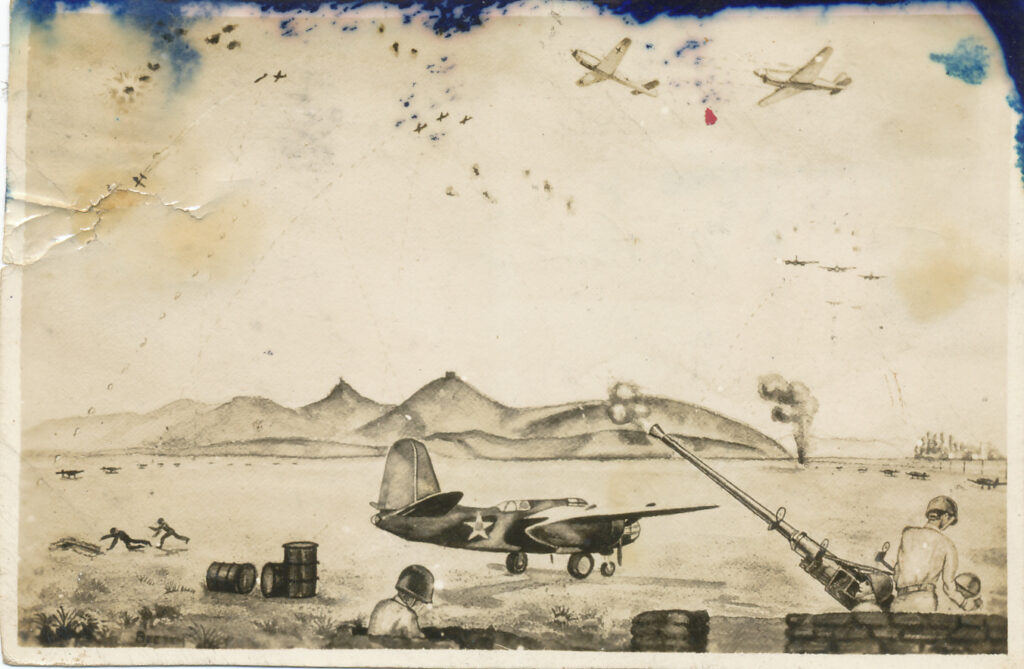
Tues., Jan. 5, 1943—I taught my last day of school in Palmetto, Fla., one year ago today, then enlisted in Tampa, Fla.
Wed., Jan. 6, 1943—Took oath one year ago today at Camp Blanding, Fla.
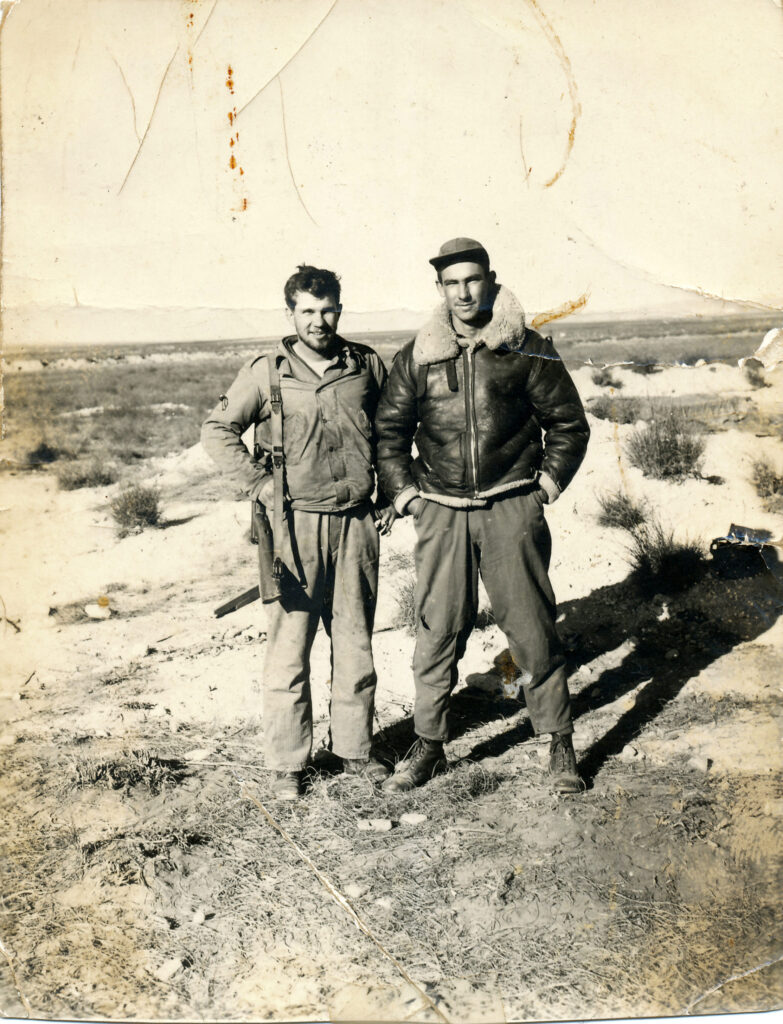
Thurs., Jan. 7, 1943—We were bombed at dusk by one JU-88. I was caught with my pants down (literally)—at the straddle trench (latrine).
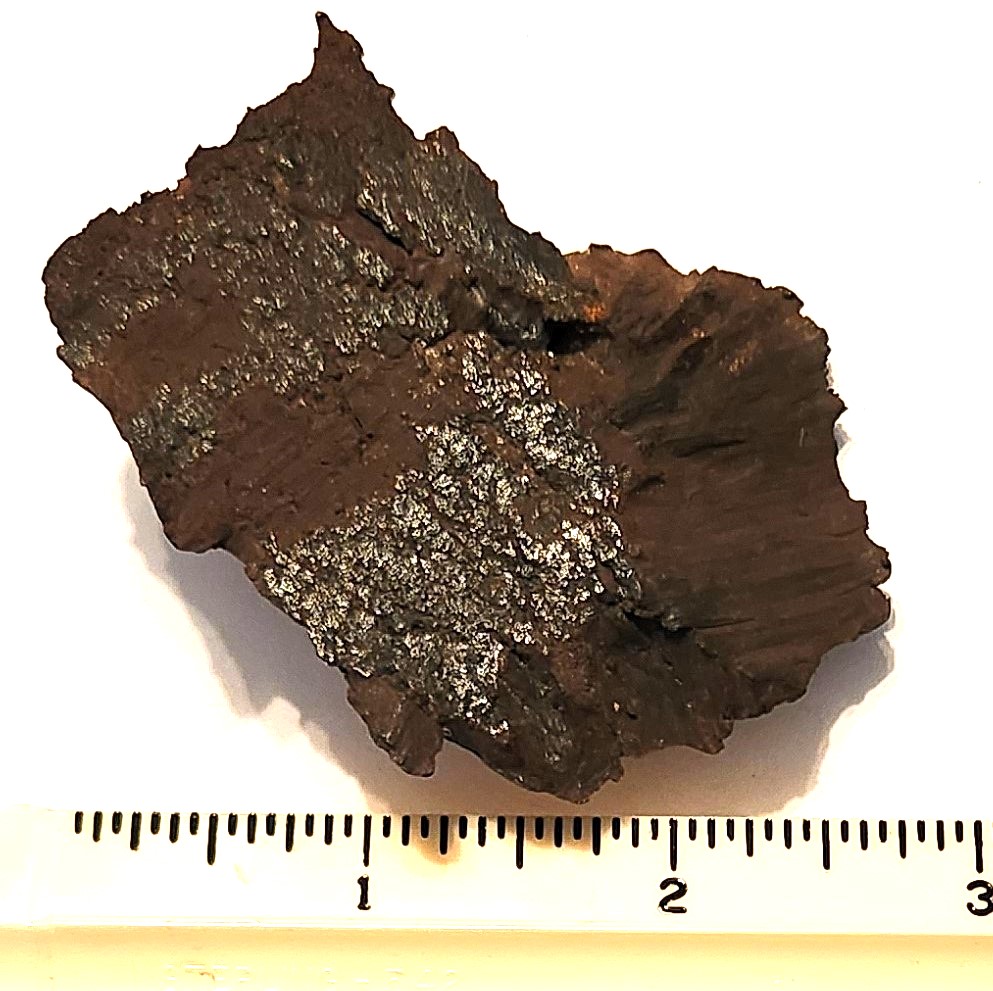
(Gap in diary.)
Sat., Jan. 9, 1943—Junior caught up with me today from Casablanca by transport plane.
Notes for above week—Major Vincent Sheean (author) was in our Operations dugout this week. . . . (General note—During our time at Thelepte “First Time” the Germans had a habit of sending over us at night a JU-88, with its unsynchronized engines, in a kind of war of nerves. It was an effective way to force us into a tight blackout condition.)
Sun., Jan. 10, 1943—Field strafed by four ME-109’s. We had a “dogfight” to liven up breakfast.
Mon., Jan. 11, 1943—Four ME’s strafed field again. Another show for breakfast. A major across the field was killed.
| Donald J. Tolle, 1988: Using descriptive terms such as “a ‘dogfight’ to liven up breakfast” and “another show for breakfast” sounds to me now like youthful bravado to cover up the fact that I was scared during the bombing and strafing raids we had at Thelepte and later. I was scared; but let me confess that after the first couple of raids I felt almost a sense of exhilaration in discovering that I was deeply afraid only during the attacks, much less so between them. I think that none of us really knew how we would react to someone’s trying hard to kill us, until we faced the reality directly. That’s the reason I had such a sense of relief to find that I didn’t have to spend an undue amount of time after a raid worrying about the next one (“Sufficient to the day is the evil thereof” and all that). But enough of philosophy and psychology. Our kitchen at Thelepte was below ground-surface, like everything else, except the planes, which were partially protected on occasion by revetments made of dirt and gasoline cans (“flimsies”) filled with dirt. The kitchen was a large head-high hole covered by canvas tarps and with dirt-filled flimsies stacked up around it for added protection. During the two attacks noted above, many of us were in the chow-line around the outside low wall of the kitchen. As the planes came in to strafe, we would run to the opposite side of the kitchen wall to keep it between us and the attacking planes. (There were few foxholes close to the kitchen, but their number grew and the depth increased in proportion to the frequency of the raids.) |
Tues., Jan. 12, 1943—Seven JU’s with ME cover bombed field this afternoon. Got two of our planes on the ground. Rhodes was hit by shrapnel but not seriously wounded. P-40’s got a JU and an ME.
Wed., Jan. 13, 1943—Junior and I were caught in the open when several JU’s bombed the field, but luckily we weren’t hit. We should have hit the ground sooner instead of trying to get to a foxhole. There was a paratrooper scare during the bombing, causing some “anxiety.”
| Donald J. Tolle, 1988: I felt fear and other emotions during this experience at Thelepte, Tunisia. My brother Junior (“Ed”) and I were crossing the field between the road and the dry river bottom (wadi) where we lived in puptents pitched over our foxholes. It was about dusk, and several German bombers suddenly appeared and began scattering their bombs. Jr. and I started to run for a foxhole and then gave that up because a stick of bombs was starting toward us. We hit the dirt, and I tried to help Jr. get his helmet on because he had it strapped over his shoulder. (Later, it seemed laughable that we had had such concern over the puny protection of a tin hat; yet, having it on did provide a small sense of security.) We hugged the ground in some trepidation, figuring that two more bombs from the plane heading toward us would see the second bomb land on us. But the bombs fell a little short, so we jumped up and ran again, trying to make it to the relative safety of our wadi before more were dropped. We had to hit the ground again two or three times before we got there, because bombs started coming down again. We had nothing but a deep sense of relief when we reached our gully, because we didn’t know that there had been a paratrooper alert during the bombing raid and that everyone in the squadron was jittery. As we made our way in the near-darkness along the dry river bottom, somebody hollered, “Halt!” And Jr. and I kept on walking, not knowing that anything was wrong. (We had a normally more relaxed style of guarding our camp than yelling “Halt!”) The guy again yelled, “Halt!”; and this time he jerked a shell into the chamber of his rifle. That made me both angry and nervous, since he had the gun pointed at me; so I yelled, “Are you kidding?” He said, “No, I’m not kidding, and if you move again I’ll shoot.” Junior unslung his Tommy gun and was going to cut him down if he shot me. I then recognized J. Owen Howard even though it was almost dark, and said, “Howard, it’s the Tolle brothers,” and we went up the slope and cussed him out. He felt a little foolish then but told us that was a good way to get shot, because we were under attack by paratroopers. Knowing that, I walked on to Junior’s hole with him and then started back to my own. Somebody fired a rifle in the darkness in front of me, and I threw myself to the ground and yelled, “Don’t shoot, you damned fool! It’s Tolle.” There was an answering shot from across the gully, and I felt very uncomfortable, not knowing which way the bullets were heading. As I started on to my hole, somebody whispered rather hoarsely, “Tolle, is that you?” I said it was; and he said, “This is John Pollock. Lend me some rifle ammunition. We’re being attacked by paratroopers.” So I handed him some .30 cal. ammo. and told him to be sure to return it in the morning. (By this time, I was about to believe the paratrooper story.) As I got near my foxhole, I saw a large hulk squatting by it in the dark, with a rifle at the ready. I saw that it was my puptent-mate, Dave Frieze, and I called out (humorously, I thought), “Is it safe to come home?” Dave startled me by plunging down the slope, yelling, “Follow me!” I certainly didn’t intend to go running aimlessly through the night with everyone in the state of nerves they were; so I stayed beside our hole and waited for him to come back. After a bit, I saw his big shape coming up the slope from the wadi bottom, and he called, “Don, is that you?” I said, “Yeah; come on home. I knew you’d get lost.” We crawled into our hole, and then I asked, “Whatever possessed you to go running off into the dark with those noble words, ‘Follow me!’?” He tried to bluster a bit at first, but I cut him short. Then he told me that he had been in our puptent when somebody ran through the gully yelling, “Paratroopers!” (It was Frank Crader, who had seen a parachute coming down during the German bombing raid; and he thought it was a German paratrooper, although it turned out later to have been a P-40 pilot whose plane had been disabled while trying to shoot down the German bombers. It is good that none of our guys tried to shoot that pilot while he was parachuting down.) When Dave heard Frank yelling about a paratrooper attack, he got his rifle and squatted beside our foxhole-home. Our next-door neighbors were Red Crane and Frank Grimm, and Dave had softly called to them. But there was no answer and he then realized that he was alone in our wadi. And suddenly something akin to panic struck him for probably the first and last time in his life. He stayed there, afraid to move in an uncertain situation; and when I had called to him, the spell was broken, and he went plunging into the darkness with his finger on the trigger, determined to sell himself dearly. (J. Owen Howard was the only one who followed him!) After he had told me his story, I said, “Dave, I’m surprised at you. Of all the people to get panic-stricken, you’re the last one I would have suspected. Don’t you feel a little bit silly?” He said, “I guess I do; but it didn’t seem silly at the time.” Then I began to laugh at him and told him how ridiculous he looked running into the night shouting, “Follow me!” Then it began to seem funny to him too; and in a few minutes we were having a case of laughing hysterics, which was the best thing that could have happened to relieve our tension. I guess that the fellows across the gully thought we had cracked under the strain. (And maybe they were right!) AFTERWORD: Of course, the reason I was relatively calm during the “paratrooper” scare was that I had missed the initial Crader warning and didn’t know about it until later in the event. My major feeling throughout was one of relief that Junior and I had survived the bombing raid, when it seemed very doubtful for awhile that we would—hence, my ability to treat rather lightly the “paratrooper” part of that night. (I also was glad that J. Owen Howard had not pulled that trigger a little earlier in the evening!) At any rate, that night qualified as one of the most anxious, yet funniest, I’ve ever spent. AFTERWORD II: An extension of the paratrooper story took place the next morning. I was in our Operations dugout and mentioned to one of my fellow enlisted men that I had nearly been shot during the confusion of the night before. Immediately an officer (who I didn’t know had heard me) said, “What’s that? Who nearly shot you?” I said, “I don’t want to say, Sir.” He looked me in the eye and said, “Corporal Tolle, I order you to tell me.” That gave me a choice: Talk or take the consequences. So, knowing that J. Owen Howard was one of his favorite engineers, I said, “Sgt. Howard, Sir.” And that’s where it ended—except that I felt “chicken” over that for a long time (maybe even now!). Actually, in one sense, J. Owen Howard could have been a hero of that nervous night if there really had been German paratroopers. And Frank Crader, the harbinger of the “attack,” could have been another. And Dave Frieze, who led a charge against the “attackers,” could surely have been in the heroic mold. (Ah, the “could-have-beens” of war!) AFTERWORD III: Another possibly related story occurred when Junior and I got back home from overseas. Our father told me that one time he had had a terrible dream that Junior and I were in extreme peril, and he had awakened from that dream calling out to us. In trying to pin-point when he had that dream, we were able to get it pretty close to the date and time of the above-noted bombing raid. But we were not able to be absolutely certain that our father’s dream occurred at the time Junior and I were fearing for our lives during that raid. But who knows? (NOTE: This account was written up many years after the war, from brief notes and from rather clear memory.) |
(Gap in diary.)
Fri., Jan. 15, 1943—Three attacks today, two by ME’s in the morning and one by 10 JU’s in the afternoon. All of the JU’s were shot down by P-40’s. Two or three of the “Peashooters” were shot down in the morning.
| Donald J. Tolle, 1988: Our best early protection at Thelepte was provided by the P-40 outfit of Major (later Lt. Col.) Philip G. Cochran (who, because of his exploits, became the inspiration for Milt Caniff’s comic strip “Flip Corkin,” which was popular for a few years during and after the war.) One of Cochran’s much talked-about feats (which I believe was true) was his taking a small bomb on his lap and dumping it out of his P-40 by hand on a nearby German headquarters, just to let the other side know that their raids had not knocked out the Thelepte field. (Cochran’s P-40’s had gotten to Thelepte a month or so before our own outfit got there.) Our ground protection against air raids was in the hands of a Bofors(40mm) anti-aircraft outfit which set up gun-pits around the airfield. (The airfield was just a plain below the mountains.) In all honesty, I will have to say that I never saw an enemy plane shot down (or even hit) by the ack-ack crews, who were mainly young and inexperienced (as, of course, most of us were). For example, one day during an air raid my brother Ed (“Junior”) was near one of the gun-pits, and he hopped into it for protection, only to find that he was the only one in it. The gun crew, believing they were the target of the attack, had run for foxholes some distance away! I did see one plane hit one day by their anti-aircraft fire: a B-25! If any plane was ever easy to identify, it was the B-25. A flight of six or so came over our field at a fairly low level, and things were normal until they got right over us, Then the Bofors crews opened up in full force, to our collective horror. We needn’t have been that concerned, though, because only one plane showed evidence of having been hit. It faltered for a few seconds and then began to pull back into formation as the flight distanced itself from the guns. (It would have been very interesting to hear the verbal reactions of those B-25 crew members!) |
(Gap in diary.)
Mon., Jan. 18, 1943—Margaret Bourke-White, Life Magazine photographer bummed a ride to Youks-les-Bain, Algeria. Lt. Brown was the pilot.
Tues., Jan. 19 – Tues., Feb. 2, 1943—(One general entry). Same old stuff every day—bad food, extremely cold nights, Sirocco by day, plenty of work to do, but no raids since the ten JU’s were shot down.
| Thelepte, Tunisia Tuesday Afternoon January 20, 1943 Lessons from War It’s funny what little things it would take to bring me enjoyment after being away from the U.S. less than five months. I’ve learned appreciation of things I’d always taken for granted—now that I can’t get them. I’ll never take a hot fudge sundae for granted again! And some good old chocolate candy!! (not that English stuff!). What I wouldn’t give for a bar of Nestlé’s almond and milk chocolate! When I get back, I’ll never walk into a drug store without a feeling akin to reverence, or into a Kress’s without thinking that here, indeed, repose the treasures of the world behind a candy counter. I would hate to think that all this is just the first reaction to doing without the ordinary pleasures of life and that a week or two back home will see me resume the same complacent attitude of expecting and accepting these little luxuries as my natural right. (Lord, keep me appreciative!) A soft bed and clean, white sheets, and a bath! How could I wait to mention a bath? And to think that I used to hate to bathe! What a prig I’ve been! And, if I can hope for a bed again, may I humbly hope also for a wife to go with it? There was a time when I would have regarded the fact that I would have a wife as more or less a matter of course. But now I approach that desire fearfully and hopefully and with uncertainty. How dare I have the temerity to even hope for a soft bed and a soft, warm wife—and love! Of this I’m sure—I’ll never lack appreciation for life’s ordinary little joys ever again. (And, Lord, make me stick to that!) |
Wed., Feb. 3, 1943—Photo-gunner Ed (Junior) Tolle went on his first mission over enemy territory today. He took about 40 pictures . . . Our field was bombed and strafed by five ME’s this afternoon. Damaged some planes; killed two pilots of the French Lafayette Escadrille on the ground. Two (and possibly a third) ME’s were shot down by Spitfires.
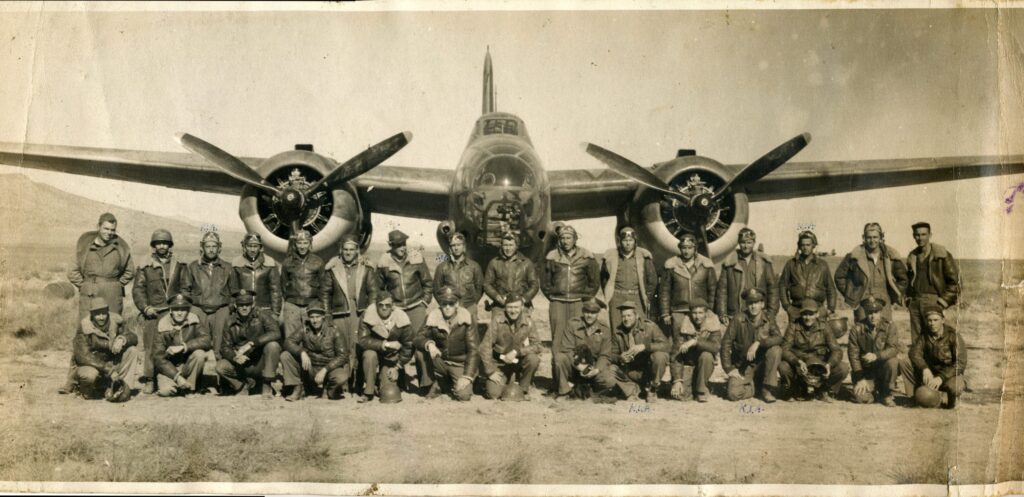
Thelepte, Tunisia. February 6, 1943.
| Front row (L-R): Lt. Deaton Lt. Smith (wounded) Lt. Rice Lt. Kuhlman Lt. Jones Capt. Willard Capt. Akers Capt. Davis Capt. Sharpless (Killed in Action) Lt. Brown Lt. Artz (Killed in Action) Lt. Young Lt. Gualtiere (wounded) Lt. Marsha | Rear Row (L-R): W.S. Thompson Haller (wounded) Adams (Killed in Action) Evans Anderson Goodwin Thurman Shepard (Killed in Action) Ernst Malzahn Donahoo ? Williamson (wounded) Abrahamson (Killed in Action) Tell Edgar Tolle (Junior) |
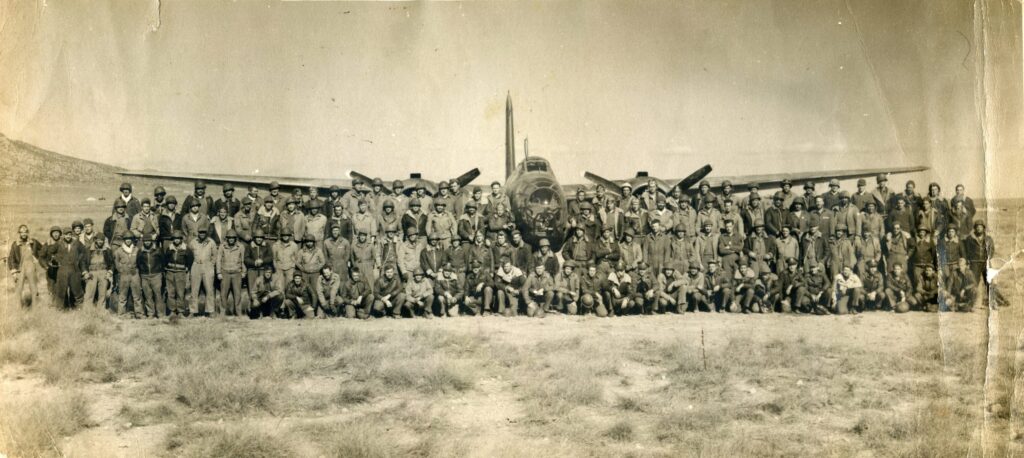
Thelepte, Tunisia. February 6, 1943. Photo taken by Ed Tolle (Junior).
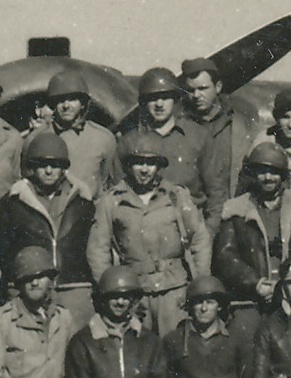
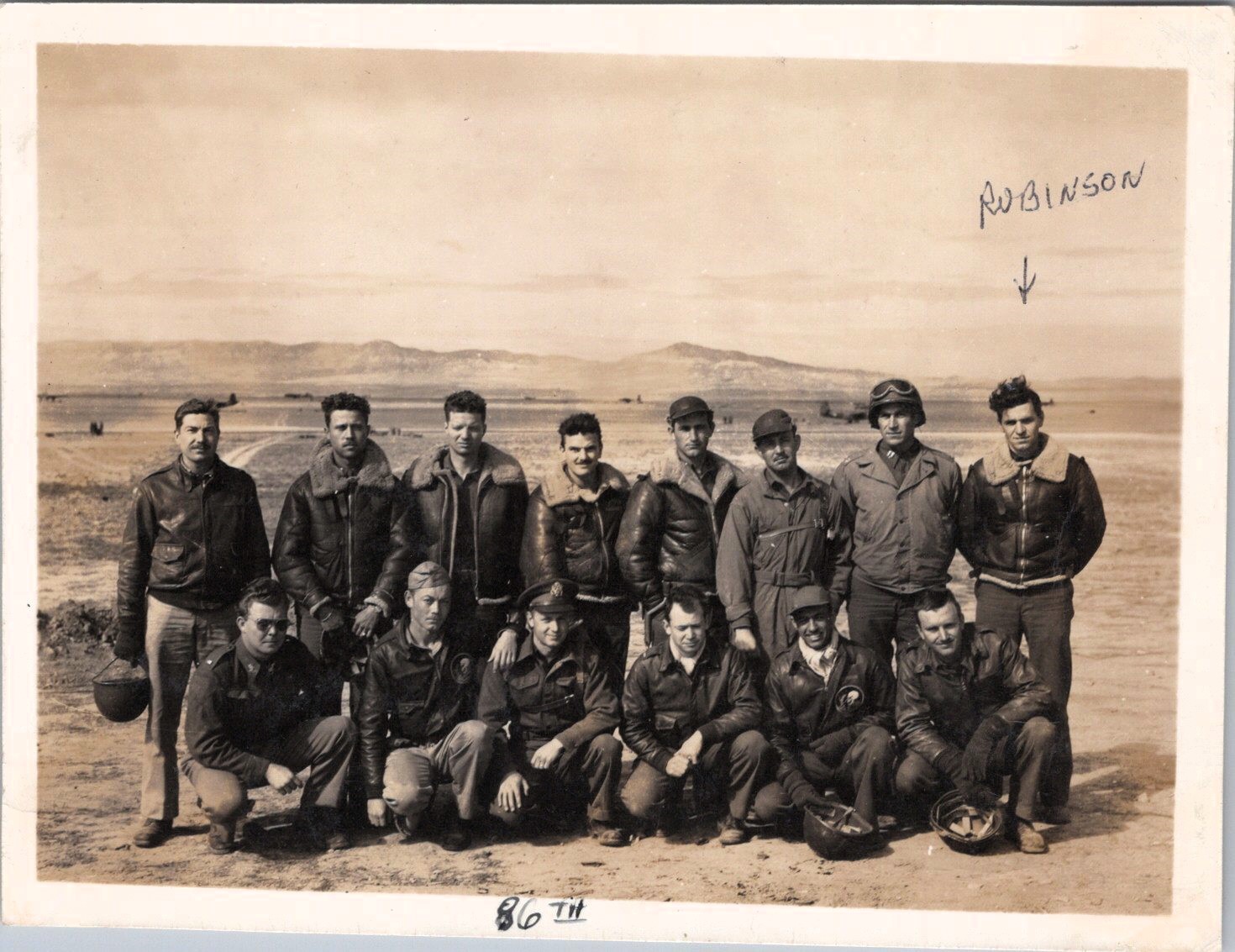
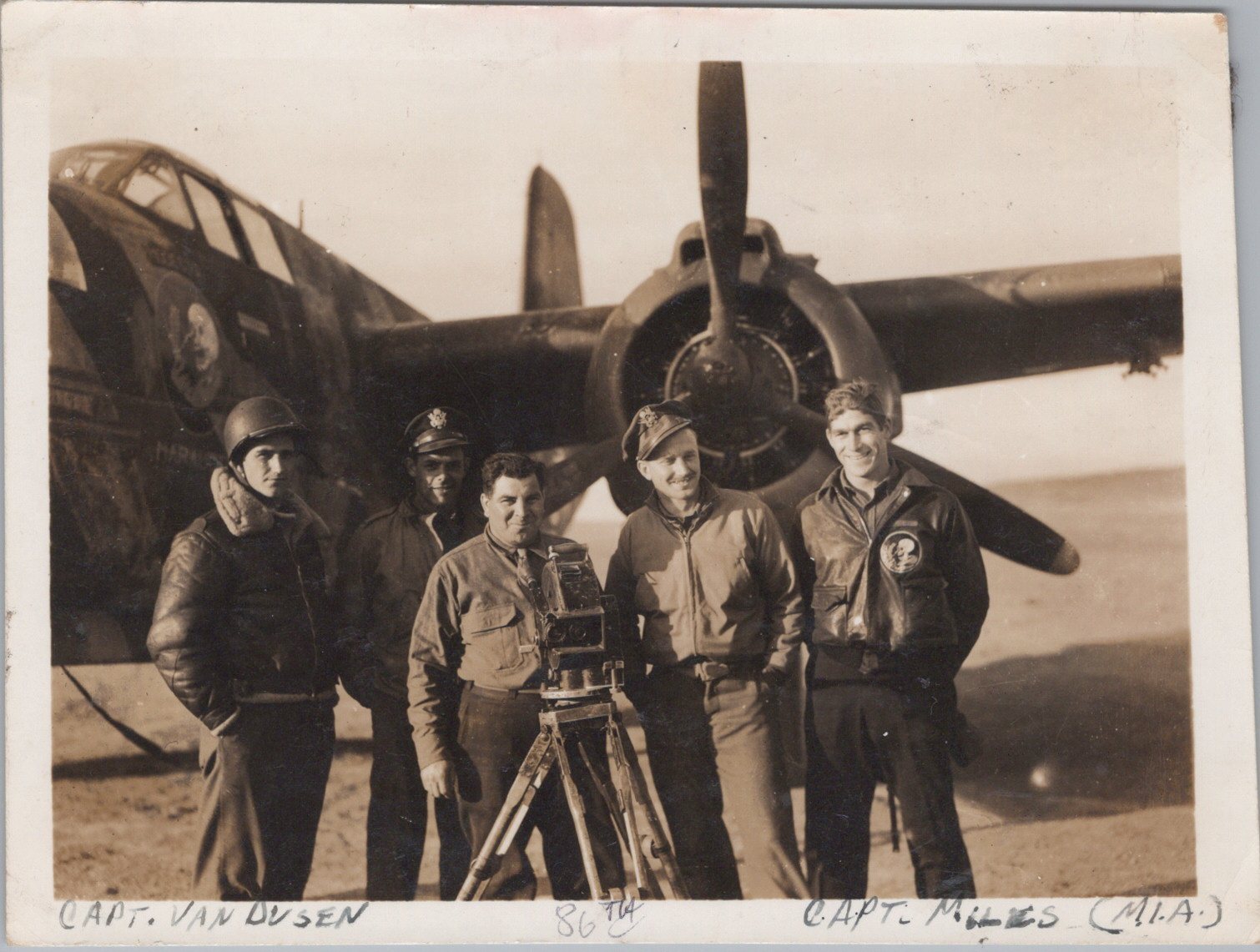
(Gap in diary.)
Mon., Feb. 8, 1943—Junior went on his second bombing mission today. It was a hot one. One piece of flak missed his head by about 3 inches. About three or four of our planes were hit. Lt. Brown’s plane was shot up, but he did a beautiful job of landing it with one wheel not down all the way. He and Thurman and Evans were lucky boys.
| Donald J. Tolle, 1988: As I recall, there were only two pairs of brothers in the 97th: Harold and Kenneth Salsbury and Edgar and Donald Tolle. Harold was a gunner and Ken an engineer. Ed (“Junior”) was a photo-gunner for awhile but was transferred from that to Group Photo sometime after Thelepte (“First Time”). I (Donald) was in 97th Sq. Operations. As nice as it was for brothers to be together (and a comfort to parents back home), I came to believe that the so-called Sullivan Rule was a good one. (Five Sullivan brothers on the same Navy ship were killed when the ship was sunk in action; and this resulted in a policy against family members being in the same outfit.) I know that the greatest stress I faced overseas was when Junior flew on the few missions he did. I really “sweated him out.” He and I both had (and have) poor vision and couldn’t physically qualify for any combat crew position. But there was great desire to have photos taken over target, so he was put on as a combat crew member. (Elmer Garrison was the other photo-gunner and completed a full combat tour.) I went to Capt. McRae, our Sq. Medical Officer, and told him that Junior’s eyes were as bad as mine and that he should either ground Jr. or approve me for combat crew status. He felt that he couldn’t do that, but fortunately (from my viewpoint) he did ground Jr. a few weeks later because of sinus problems which gave him severe headaches while in the air. Then when I flew on a few missions (which I was able to arrange in Operations without being officially on a combat crew), Junior gave me an ultimatum never to go on another mission or he would somehow get back on combat crew status. So we had an impasse: I opposed his flying, and he opposed mine; so neither of us flew on combat missions again. My point in all this is that having brothers together in combat situations may tend to make them both less effective because of worrying over the other one. I can’t speak for the Salsbury brothers, but I don’t know how Ken stood the stress of seeing Harold fly a full combat tour (not to mention Harold’s stress while doing so!). |
(Gap in diary.)
Sun., Feb. 14, 1943—Some planes of the 85th Sq. were shot up in the air by ME’s. One crash-landed (1 killed). One exploded over our field (4 killed).
